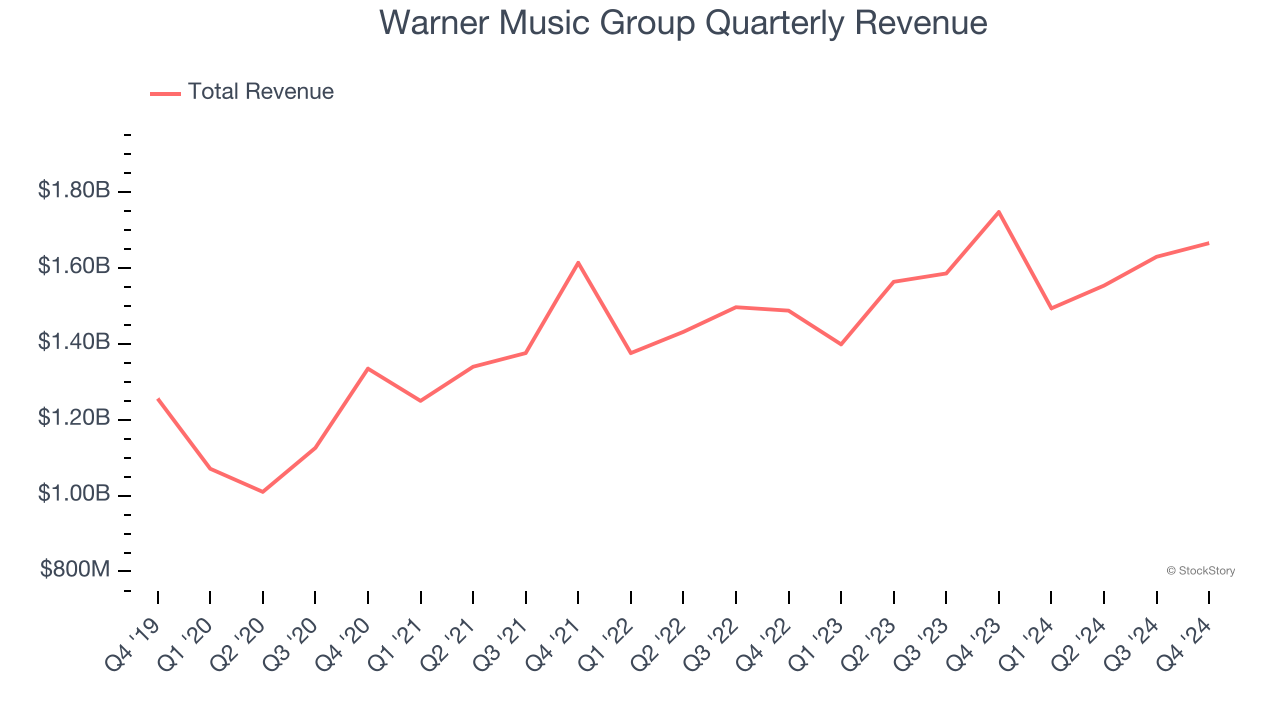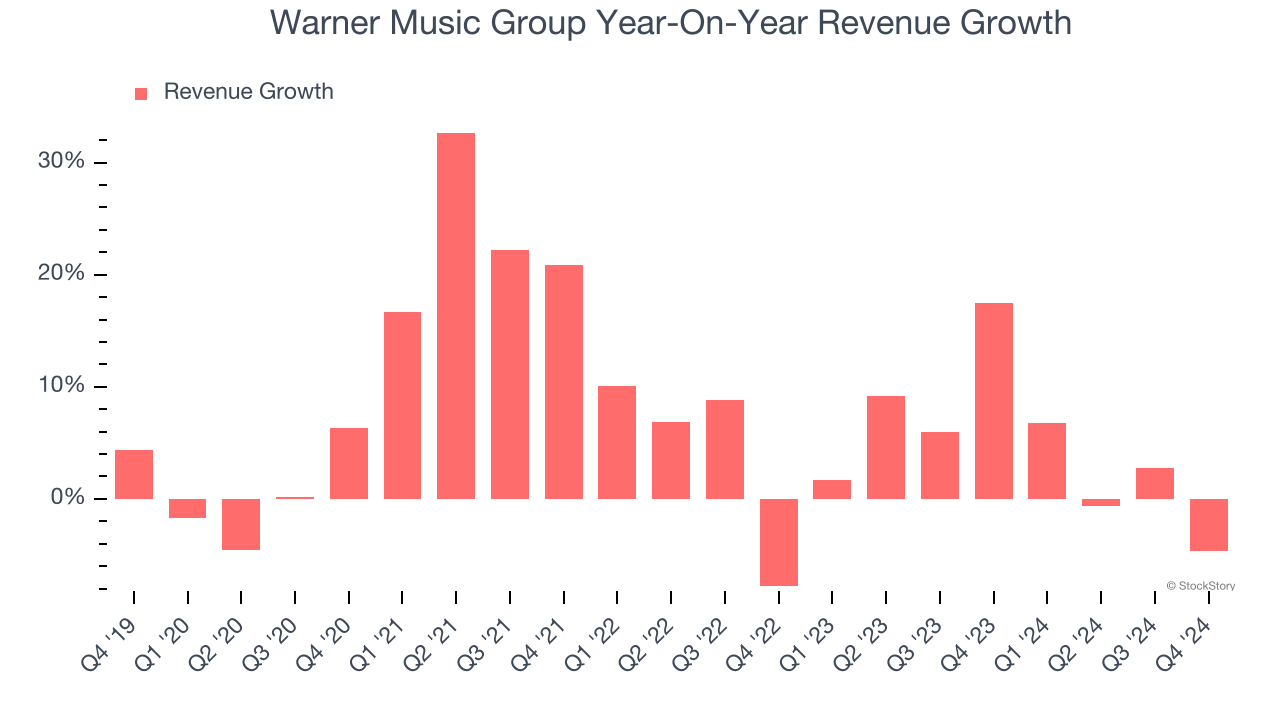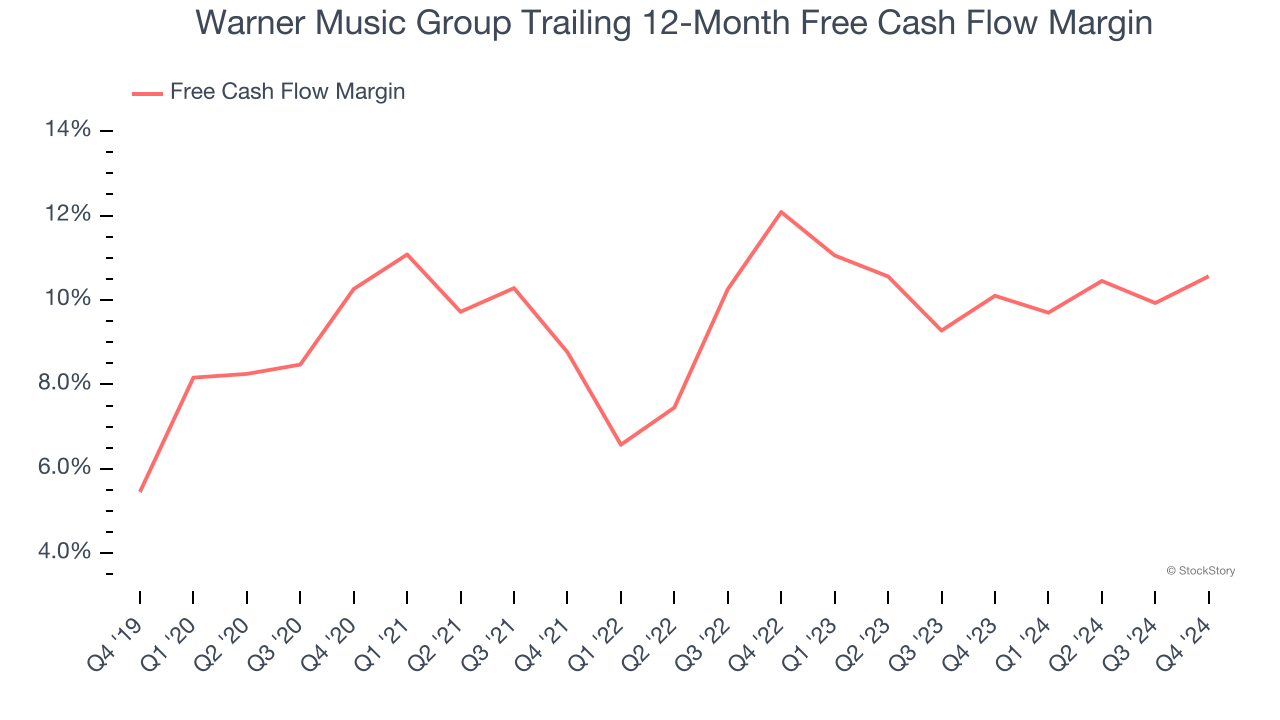
Global music entertainment company Warner Music Group (NASDAQ:WMG) met Wall Street’s revenue expectations in Q4 CY2024, but sales fell by 4.7% year on year to $1.67 billion. Its GAAP profit of $0.45 per share was 34% above analysts’ consensus estimates.
Is now the time to buy Warner Music Group? Find out by accessing our full research report, it’s free.
Warner Music Group (WMG) Q4 CY2024 Highlights:
- Revenue: $1.67 billion vs analyst estimates of $1.66 billion (4.7% year-on-year decline, in line)
- EPS (GAAP): $0.45 vs analyst estimates of $0.34 (34% beat)
- Adjusted EBITDA: $363 million vs analyst estimates of $379.4 million (21.8% margin, 4.3% miss)
- Operating Margin: 12.8%, down from 20.3% in the same quarter last year
- Free Cash Flow Margin: 17.8%, up from 15.1% in the same quarter last year
- Market Capitalization: $16.68 billion
Company Overview
Launching the careers of legendary artists like Frank Sinatra, Warner Music Group (NASDAQ:WMG) is a music company managing a diverse portfolio of artists, recordings, and music publishing services worldwide.
Media
The advent of the internet changed how shows, films, music, and overall information flow. As a result, many media companies now face secular headwinds as attention shifts online. Some have made concerted efforts to adapt by introducing digital subscriptions, podcasts, and streaming platforms. Time will tell if their strategies succeed and which companies will emerge as the long-term winners.
Sales Growth
Reviewing a company’s long-term sales performance reveals insights into its quality. Any business can have short-term success, but a top-tier one grows for years. Regrettably, Warner Music Group’s sales grew at a sluggish 7% compounded annual growth rate over the last five years. This fell short of our benchmark for the consumer discretionary sector and is a tough starting point for our analysis.

Long-term growth is the most important, but within consumer discretionary, product cycles are short and revenue can be hit-driven due to rapidly changing trends and consumer preferences. Warner Music Group’s recent history shows its demand slowed as its annualized revenue growth of 4.6% over the last two years is below its five-year trend. 
We can better understand the company’s revenue dynamics by analyzing its most important segments, Recorded Music and Music Publishing, which are 80.7% and 19.4% of revenue. Over the last two years, Warner Music Group’s Recorded Music revenue (new music production) averaged 3.3% year-on-year growth while its Music Publishing revenue (royalties from catalog music) averaged 12.3% growth.
This quarter, Warner Music Group reported a rather uninspiring 4.7% year-on-year revenue decline to $1.67 billion of revenue, in line with Wall Street’s estimates.
Looking ahead, sell-side analysts expect revenue to grow 5% over the next 12 months, similar to its two-year rate. This projection is underwhelming and suggests its newer products and services will not catalyze better top-line performance yet.
Unless you’ve been living under a rock, it should be obvious by now that generative AI is going to have a huge impact on how large corporations do business. While Nvidia and AMD are trading close to all-time highs, we prefer a lesser-known (but still profitable) stock benefiting from the rise of AI. Click here to access our free report one of our favorites growth stories.
Cash Is King
Although earnings are undoubtedly valuable for assessing company performance, we believe cash is king because you can’t use accounting profits to pay the bills.
Warner Music Group has shown decent cash profitability, giving it some flexibility to reinvest or return capital to investors. The company’s free cash flow margin averaged 10.3% over the last two years, slightly better than the broader consumer discretionary sector.

Warner Music Group’s free cash flow clocked in at $296 million in Q4, equivalent to a 17.8% margin. This result was good as its margin was 2.7 percentage points higher than in the same quarter last year, but we wouldn’t put too much weight on the short term because investment needs can be seasonal, causing temporary swings. Long-term trends are more important.
Key Takeaways from Warner Music Group’s Q4 Results
We were impressed by how significantly Warner Music Group exceeded analysts’ EPS expectations this quarter. On the other hand, its Recorded Music revenue missed and its EBITDA fell short of Wall Street’s estimates. Management called out "temporary macro conditions created some pressure this quarter". Overall, this quarter was mixed, and the stock traded down 1% to $31.77 immediately after reporting.
Is Warner Music Group an attractive investment opportunity at the current price? The latest quarter does matter, but not nearly as much as longer-term fundamentals and valuation, when deciding if the stock is a buy. We cover that in our actionable full research report which you can read here, it’s free.
